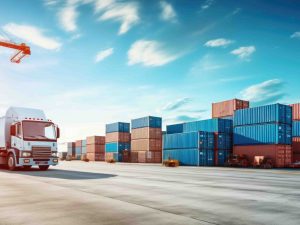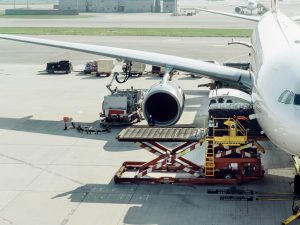Apeksha Gupta, Head of Skilling, VCJ Foundation said, “The government’s focus on upgrading infrastructure and warehousing for air cargo, especially for high-value perishables and agricultural products, is poised to significantly boost air cargo growth. By streamlining cargo screening and customs protocols, reducing transit times, and enhancing supply chain resilience, this initiative will attract more investments and improve global trade competitiveness. With the ambitious target of handling 10 million tonnes of air cargo by 2030, these measures will drive substantial growth in the logistics and warehousing sectors, benefiting both urban and rural markets. According to IATA, air cargo volumes are predicted to rise by 5.8% in 2025, reaching 72.5 million tonnes.”
Read More »PMGS, NLP to catapult India’s LPI ranking by 2030
Continuous infrastructure development under the PM Gati Shakti and National Logistics Policy initiatives will help in pushing India among top 25 nations on the World Bank Logistics Performance Index by the year 2030, a Messe Stuttgart India and EAC International Consulting report stated. India currently is placed at number 38 in the World Bank Logistics Performance Index. The Indian logistics sector is projected to reach US$ 484.43 billion by 2029 at a compound annual growth rate of 8.8 per cent. This target can realistically be achieved with a strong support from PMGS and NLP as 434 projects worth Rs 11.17 lakh Cr. Have already been identified to enhance the growth of India’s logistics sector.
Read More »Cargo handling at ports up 3.5% CAGR – Sonowal
The cargo volumes handled at the Indian ports has increased to 819.23 million tonnes in FY 2023-24 from 581.34 million tonnes in 2014-15, at a compound annual growth rate (CAGR) of 3.5 per cent, Sarbananda Sonowal, Minister of Ports, Shipping and Waterways, mentioned in a written reply to Rajya Sabha. The growth in cargo volumes is majorly contributed by dry bulk cargo (44.04 per cent) and liquid bulk cargo (33.8 per cent). The infrastructure development of major ports is in process, which involves the establishment of new berths and terminals, renovation of existing berths and terminals, deepening of drafts for attracting large vessels and road and rail connectivity development, he added.
Read More »India Post, RapidShyp collaborate for last-mile deliveries
RapidShyp has announced a collaboration with India Post for last-mile delivery across India. The strategic partnership aims to assist the D2C (Direct to Customer) businesses and address the growing demand growth in the sector. Through this collaboration, RapidShyp will integrate its logistics technology with India Post’s unparalleled reach, ensuring accurate and fast last-mile delivery services, an official release stated. “By integrating India Post’s trusted network with RapidShyp’s innovative platform, we’re not just expanding reach- we’re setting a new benchmark in logistics efficiency and customer satisfaction. Sellers now have access to a logistics ecosystem that simplifies operations and delivers results, no matter where their customers are located. With India Post as our partner, businesses can confidently cater to remote and underserved regions, unlocking new growth opportunities,” Ravi Goel, Chief Business Officer, RapidShyp, said.
Read More »2% YoY demand growth for air cargo in January – Xeneta
According to Xeneta, the air cargo demand stood at 2 per cent YoY in January 2025 in comparison to the corresponding period in 2024. This growth is lower -than-expected as there was double-digit growth in air cargo demand growth throughout the year 2024. “January’s data was impacted by the earlier Lunar New Year reducing volumes out of China, but the big drop in demand was still as a surprise,” says Xeneta’s Chief Airfreight Officer, Niall van de Wouw. “The lower growth in air cargo demand in January was not down to President Trump, nor, entirely, the earlier Lunar New Year. It also compares to an unusually high comparison in January 2024. Nonetheless, the air cargo market in entering a period of uncertainty, which makes planning extremely challenging.” he added.
Read More »JNPA records 23% YoY growth in container volumes in Jan
Jawaharlal Nehru Port Authority (JNPA) has reported an increase of 23 per cent YoY in container volumes in January 2025. It handled a total of 6,35,665 TEUs during the period. During the period April 2024 to January 2025, the authority handled 6,013,086 TEUs of container volumes, which resulted in a 14.08 per cent increase year on year, as per an official release. “During January 2025, JNPA handled 641 container rakes and 101,984 TEUs as compared to 542 rakes and 84,752 TEUs during the corresponding period in the previous financial year. This is the highest-ever rail traffic handled in a month, surpassing the previous highest of 100,166 TEUs in March 2010,” the report further stated.
Read More »IIT Madras, CII join hands to relaunch SCMPro
IIT Madras and CII Institute of Logistics have collaborated to relaunch the ‘Supply Chain Management Professional’ (SCMPro) certification programme. The programme will be operated via IIT Madras Centre for Outreach and Digital Education (CODE). It will help in educating supply chain management professionals, featuring video lectures from the faculty of IIT Madras. The programme will be highly beneficial for the professionals from manufacturing, IT, e-Commerce, Retail, FMCG, logistics professionals and students. The course is set to commence on April 1, 2025, and it is crucial to know that the deadline to register for this year’s batch is March 31. The SCMPro certification programme has already trained more than 40,000 professionals in past 10 years. The new curriculum has been curated to ensure participants can develop skills and get insights into supply chain management.
Read More »Mahindra Logistics leases warehousing facility in Pune
Mahindra Logistics has signed a five-year contract for a warehousing facility, spreading around half a million sq. ft area in Pune’s Khed locality. The contract is signed for a period of 5 years, with a monthly rent of Rs 1.15 Cr. Mahindra has signed the leasing contract with Karanje Emerald Logistics Park, located in Village KaranjeVihire, Khed, Pune. Mahindra Logistics has paid a security deposit of 3.45 Cr., to occupy a built-up area of more than 475,000 sq.ft. The agreement clearly states a 5-year license period, which commenced on January 3, 2025. This strategic decision will elevate Mahindra Logistics presence in India’s warehousing sector, said release.
Read More »Astral Aviation appoints two GSAs for key markets
Astral Aviation has appointed two General Sales Agent (GSA) to enhance global presence and service delivery in Europe, USA, and China. The firm has appointed Network Aviation Group as the GSA for Europe and the United States of America, whereas HIT Cargo Asia will serve as the GSA for mainland People’s Republic of China. Network Aviation Group, with its extensive experience and established presence in Europe and the United States, will play a pivotal role in strengthening Astral Aviation’s cargo operations. Also, HIT Cargo Asia will represent Astral Aviation in mainland China. The cargo carrier’s comprehensive market knowledge and operational expertise will ensure efficient and reliable service delivery to users in China. “We are delighted to partner with Network Aviation Group as our GSA for Europe and the USA. Their deep understanding of the air cargo industry and their commitment to excellence make them the ideal partner to represent our interests and serve users in these key markets. Also, “Mainland China is a vital market for our global operations, and we are excited to work with HIT Cargo Asia. Their reputation for reliability and excellence aligns perfectly with our mission to provide world-class cargo solutions.”,” Sanjeev Gadhia, CEO, Astral Aviation, said.
Read More »NAM adds Boeing 747-400 freighter to strengthen fleet
Network Airline Management (NAM) continues to strengthen and expand its fleet of aircraft by adding a further B747-400F production freighter to its ranks. The additional nose-loading aircraft, registered as TF-AKG, joined NAM’s fleet at the end of last year. The addition of this aircraft further enhances NAM’s ability to meet the growing demand for air cargo transportation around the world, particularly for large and specialised shipments. As of January 2025, the NAM fleet operates three B747 production freighter, nose door aircraft, plus a B747-400BDSF converted freighter aircraft. “Adding another B747 nose door aircraft to our fleet is a step in the right direction to becoming an all-production freighter fleet. This latest addition is an ex-China Airlines Cargo freighter which has already begun delivering world-class cargo services. Renowned for its exceptional range, payload capacity, and reliability, the Boeing 747 is the ultimate workhorse for global air cargo operations,” Jonathan Clark, CEO, Network Aviation Group, said.
Read More » Cargo Breaking News
Cargo Breaking News









